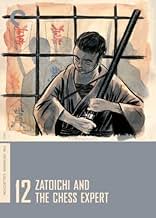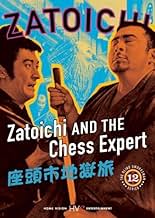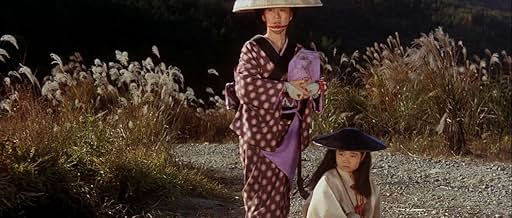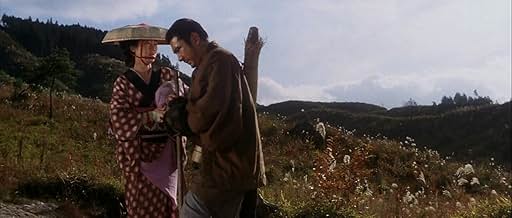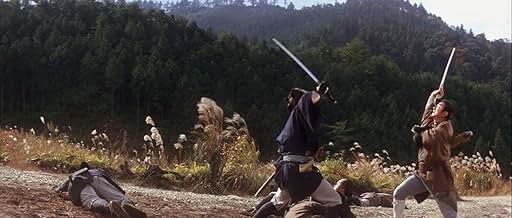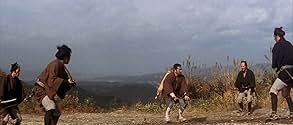IMDb-BEWERTUNG
7,3/10
1684
IHRE BEWERTUNG
Füge eine Handlung in deiner Sprache hinzuA samurai with a high skill in chess makes friends with Zatoichi, who finds that things become peculiar in his presence.A samurai with a high skill in chess makes friends with Zatoichi, who finds that things become peculiar in his presence.A samurai with a high skill in chess makes friends with Zatoichi, who finds that things become peculiar in his presence.
- Regie
- Drehbuch
- Hauptbesetzung
Empfohlene Bewertungen
Zatoichi films are all pretty similar. There are gambling (dice) scenes, Zatoichi vs. large gang fighting scenes, massaging scenes (usually of beautiful women), Zatoichi eating and drinking scenes, bath scenes, travel sequences, often a scenes with a child (or children) - and they all wonderful. One other consistent element is that they all are shot in glorious widescreen and contain some exquisite cinematography. I always find at least a couple of scenes in each film of this series to be quite breathtaking - certainly worthy of pondering over. I find these films so appealing regardless that I know exactly what is to come.
In this chapter Zatoichi meets a rather confident and intelligent foe in the guise of a chess expert. This is, of course, after he has easily defeated all his lesser foes who seek vengeance on his gambling prowess (sound familiar?). We have a female love interest and Zatoichi spurning her because of his opinion of his own "lowlife" status. All in all I was more enthralled with the first 3/4's of this particular film, but felt it failed slightly at the end. Still I think the world of Zatoichi so I give this 4.5 /5
In this chapter Zatoichi meets a rather confident and intelligent foe in the guise of a chess expert. This is, of course, after he has easily defeated all his lesser foes who seek vengeance on his gambling prowess (sound familiar?). We have a female love interest and Zatoichi spurning her because of his opinion of his own "lowlife" status. All in all I was more enthralled with the first 3/4's of this particular film, but felt it failed slightly at the end. Still I think the world of Zatoichi so I give this 4.5 /5
Good combination of humor, action and a couple of twists (although if one watches enough of the Zatoichi movies, twists should be expected). I especially thought in this movie, Zatoichi came across more human and not just the guy that hides his cleverness through bumbling. Things to watch for: Zatoichi hustling the dice players but also failing at his own game, the battle in the swamp with his desperate search for the box of medicine and not one but two suspenseful battles at the end. His discussion with the chess expert on fighting was also insightful. There are swordfights and these last a little longer than the earlier movies but no geysers of blood or decapitated limbs so stay away if you are looking for that.
The state of blindness does not hinder the swordsman masseur, Zato Ichi, in this well-crafted tale of pre-modern Japan, as he is determined to do what is correct by assisting a young girl's recovery from a severe wound suffered in tangential fashion during a sword-fight involving gangsters in the bandit-ridden country. Of the approximately 25 Zato Ichi films, this must rank as one of the better ones, as Shintaro Katsu who portrays the sightless samurai during the entire series, permits us to see more of the inner man behind the warrior facade, aided by an interesting story written by Kan Shimozawa, who contributes the most complex scenarios of this group of works. In early civilized Japan, all masseurs were blind, as then they could not look upon the bodies of their clients, and Zato Ichi ("Ichi the Masseur") is following this tradition, but he is as well an inordinately successful warrior with his cane sword, mastering with cold aplomb each challenge by aggressors, no matter how many they might be. Ichi is a prototypical loner who makes his way in this work, as in all others, by massaging, while handsomely adding to his income through his cheating skills at gambling, since he is also an inveterate confidence man, yet one who makes mistakes and these errors in judgement serve in strengthening his accessibility to the viewer. There is a pleasingly intricate plot, which places Ichi as a travelling companion of an itinerant samurai named Jumonji, played well by Mikio Narita in his first cinematic role, who is the chess expert of the English language title, and the two interact with several other groups of characters in a neatly-woven narrative. The complicated scenario is capably handled by veteran director of samurai motion pictures, Kenji Misumi, who later added other outstanding Zato Ichi films to this first one in his list, as he balances the interwoven dramatics neatly and nicely. Reasons for the societal and artistic success of this series are manifest in this film, wherein Ichi represents values that most peoples are struggling to identify and capture, with the blind swordsman becoming an iconic figure as he stumbles and totters, rather than riding, into the sunset, after completing his clash with evil.
There's little to recommend about this cheaply made samurai film. The films of this genre boast great patience, but within that patience there ought to be at least a few good samurai battles. There are only two real battles in this one. The first one has a neat setting, but it takes place during the night and it is so dark that it is difficult to see anything. The climactic battle, which is actually two consecutive battles, is very good but nothing compared to those in much more well known samurai flicks. The editing of the film is consistently poor and reduces the effectiveness of many of its scenes. This movie is only 90 minutes long, but it feels as long as The Seven Samurai. 5/10.
This is another good performance from Shintaro Katsu as Zatoichi. Also, the character, Jumonji, was very versatile. First, he befriends Zatoichi on a boat journey, where they play a game of chess. After they land in town, they stay at the same inn,and Zatoichi becomes the area masseur in the inn. Then, Jumonji finally challenges Zatoichi to a fight. What's really intriguing about this film is that the compassion that Zatoichi has for children. When the little girl thanks him for getting her the medicine needed to save her life, he gets all emotional and has to run outside. And another heartwarming scene is towards the end of the movie, when she helps Zatoichi with his shoes, he gets down and touches her face, before he moves on his journey.
Wusstest du schon
- WissenswertesThis is the twelfth of 26 films to star Shintaro Katsu as Zatoichi
- VerbindungenFollowed by Zatôichi no uta ga kikoeru (1966)
Top-Auswahl
Melde dich zum Bewerten an und greife auf die Watchlist für personalisierte Empfehlungen zu.
- How long is Zatoichi and the Chess Expert?Powered by Alexa
Details
- Erscheinungsdatum
- Herkunftsland
- Sprache
- Auch bekannt als
- Zatoichi and the Chess Expert
- Produktionsfirma
- Weitere beteiligte Unternehmen bei IMDbPro anzeigen
- Laufzeit1 Stunde 27 Minuten
- Seitenverhältnis
- 2.35 : 1
Zu dieser Seite beitragen
Bearbeitung vorschlagen oder fehlenden Inhalt hinzufügen

Oberste Lücke
By what name was Zatôichi jigoku-tabi (1965) officially released in India in English?
Antwort
